
Find Help
More Items From Ergsy search
-

How does ADHD affect executive function?
Relevance: 100%
-

What is ADHD?
Relevance: 53%
-

Is there a cure for ADHD?
Relevance: 47%
-

What causes ADHD?
Relevance: 47%
-

Can lifestyle changes help manage ADHD?
Relevance: 43%
-
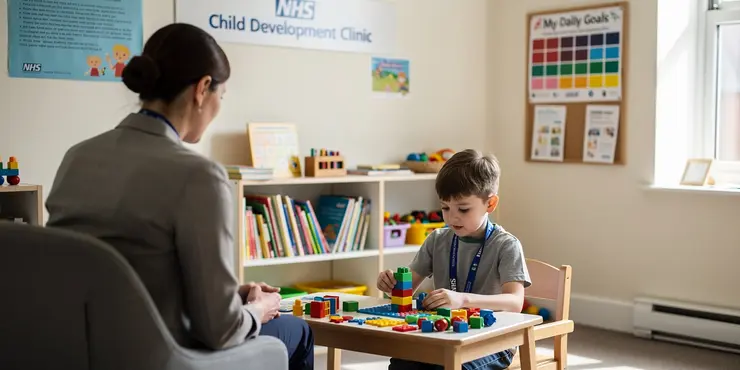
How is ADHD diagnosed?
Relevance: 43%
-

Attention deficit hyperactivity disorder (ADHD) - Living with ADHD
Relevance: 42%
-

Are there different types of ADHD?
Relevance: 41%
-

Can ADHD be inherited?
Relevance: 39%
-

Can diet affect ADHD symptoms?
Relevance: 39%
-
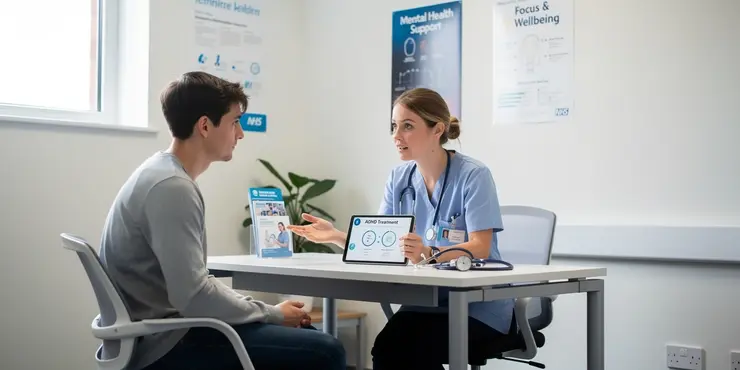
What are common treatments for ADHD?
Relevance: 39%
-

Are there any risks associated with untreated ADHD?
Relevance: 38%
-

Attention deficit hyperactivity disorder (ADHD) - Introduction
Relevance: 38%
-

Can adults have ADHD?
Relevance: 38%
-

Can therapy help individuals with ADHD?
Relevance: 37%
-

What are the main symptoms of ADHD?
Relevance: 37%
-

Is ADHD more common in boys or girls?
Relevance: 36%
-

What role does the environment play in ADHD?
Relevance: 36%
-
How can I get tested for ADHD?
Relevance: 36%
-

Attention deficit hyperactivity disorder (ADHD) - Diagnosis
Relevance: 35%
-
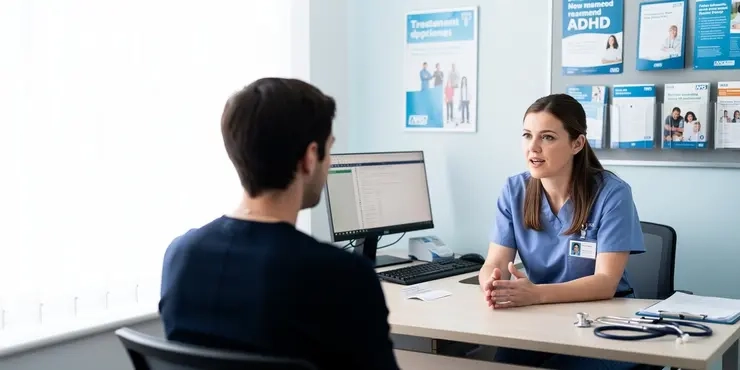
Attention deficit hyperactivity disorder (ADHD) - Treatment
Relevance: 35%
-

How can teachers support students with ADHD?
Relevance: 34%
-

What is ADHD?
Relevance: 31%
-

Does Ozempic have an impact on kidney function?
Relevance: 27%
-
How do mixed exercises aid in functional fitness?
Relevance: 27%
-
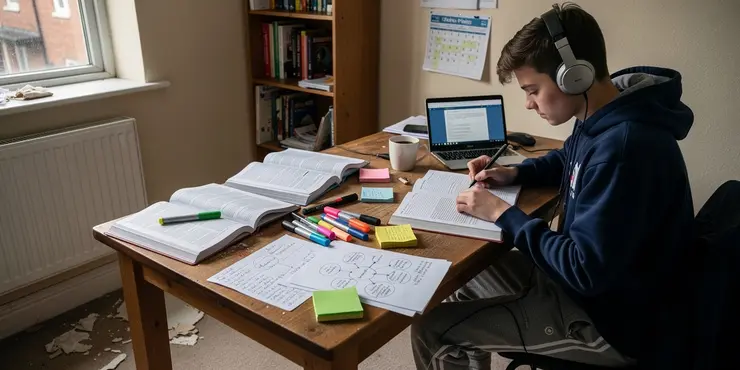
Can ADHD affect academic performance?
Relevance: 26%
-

How does Huntington's disease affect cognition?
Relevance: 17%
-

What are some common types of SEND?
Relevance: 15%
-

Can children benefit from chiropractic care?
Relevance: 14%
-

What is a smart contract?
Relevance: 12%
-

How do cognitive changes in older adults influence driving risk?
Relevance: 12%
-

Dyspraxia Symptoms & Signs
Relevance: 12%
-

What is the Chief Law Officer for England and Wales Office?
Relevance: 11%
-
What is Neurodiversity?
Relevance: 10%
-
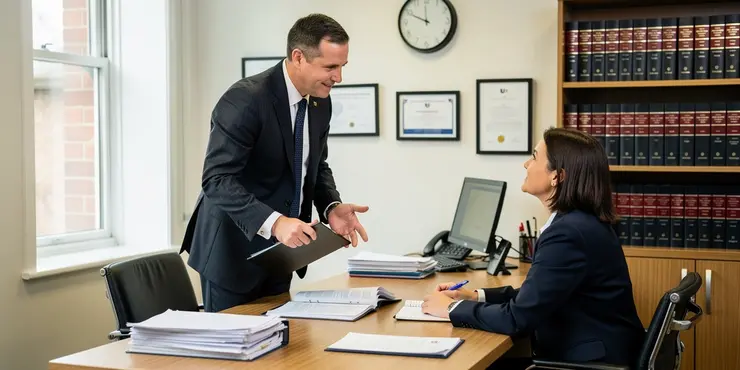
Can the Chief Law Officer for England and Wales overrule a court?
Relevance: 10%
-

Understanding Mental Health in Children
Relevance: 9%
-

Why is there concern about paracetamol and autism?
Relevance: 9%
-

What is the Small Business Administration (SBA)?
Relevance: 9%
-

Has paracetamol been linked to other developmental issues besides autism?
Relevance: 9%
-

Do all women experience cognitive decline after menopause?
Relevance: 8%
Understanding ADHD and Executive Function
Attention Deficit Hyperactivity Disorder (ADHD) is a condition that affects millions worldwide, including a significant number of individuals in the UK. ADHD is characterised by a persistent pattern of inattention, hyperactivity, and impulsivity. These symptoms are often linked to difficulties with executive function, a set of mental skills that include working memory, flexible thinking, and self-control.
What is Executive Function?
Executive function refers to the mental processes that enable individuals to plan, focus attention, remember instructions, and manage multiple tasks successfully. It is crucial for goal-directed behaviour, problem-solving, and the ability to adapt to new and unexpected situations. These skills are controlled by the frontal lobes of the brain, which are known to develop more slowly in individuals with ADHD.
Impact of ADHD on Executive Function
For individuals with ADHD, deficits in executive function can manifest in various challenging ways. They might struggle with planning and organising tasks, managing time effectively, and prioritising activities. Because executive functioning is essential for managing daily life, these difficulties can impact educational, occupational, and social outcomes. For example, students with ADHD may find it hard to complete assignments on time, while adults might struggle with meeting work deadlines.
Working Memory Challenges
ADHD often impairs working memory, the ability to hold information in mind and use it. This can make it challenging to follow multi-step instructions or keep track of what they are doing, leading to mistakes or incomplete tasks. It affects academic performance and daily routines, like shopping or remembering appointments.
Issues with Attention and Focus
While ADHD is commonly associated with a lack of focus, it can also mean difficulty regulating one's attention span. Individuals may become easily distracted by irrelevant stimuli or have trouble sustaining attention over extended periods. This can lead to incomplete tasks or projects, as they might switch between activities without completing them.
Impulsivity and Self-Control
Executive function deficits in people with ADHD often include impulsivity and poor self-control. These individuals may act without thinking, make hasty decisions, or interrupt others. Impulsivity can have far-reaching effects, such as difficulties in social relationships or financial management. Furthermore, emotional regulation might be impaired, making it hard to control responses to frustration or stress.
Improving Executive Function in ADHD
Treatment for ADHD often involves a combination of medication, behavioural therapy, and strategies to improve executive function. Cognitive-behavioural techniques can help individuals develop better organisational skills and coping strategies. Educational support and accommodations can also assist students with ADHD in managing their academic responsibilities more effectively.
Conclusion
In summary, ADHD significantly impacts executive function, resulting in various difficulties in managing tasks, maintaining focus, and regulating behaviour. Understanding these challenges is crucial for developing effective interventions and support systems that help individuals with ADHD lead more productive and fulfilling lives. In the UK, increasing awareness and access to appropriate treatments and educational provisions can greatly enhance the quality of life for those affected by ADHD.
Understanding ADHD and How It Affects Thinking Skills
ADHD means Attention Deficit Hyperactivity Disorder. It affects many people around the world, including in the UK. ADHD makes it hard to pay attention, sit still, and not act without thinking. These problems are often linked to issues with thinking skills called 'executive function'. Executive function includes remembering things, thinking flexibly, and controlling ourselves.
What is Executive Function?
Executive function is a set of skills that help people make plans, focus on tasks, remember what to do, and handle more than one thing at a time. It helps us reach goals, solve problems, and deal with new situations. These skills come from a part of the brain called the frontal lobes. This part of the brain grows more slowly in people with ADHD.
How ADHD Affects Thinking Skills
People with ADHD can have trouble with their thinking skills. They may find it hard to plan tasks, organise their time, and know what is most important to do first. These issues can make school, work, and social life harder. For example, kids with ADHD might struggle to finish homework, and adults might find it hard to meet work deadlines.
Challenges with Remembering
ADHD often makes it hard to remember things while doing them. This is called "working memory." It can be tough to follow long instructions or keep track of tasks, leading to mistakes or unfinished work. This affects school performance and daily activities like shopping or remembering appointments.
Problems with Paying Attention
ADHD is not just about not being able to focus. It can also mean having trouble paying attention for a long time. People might get easily distracted or switch between tasks without finishing them, leading to incomplete projects.
Acting Without Thinking and Self-Control
People with ADHD might act without thinking because of problems with executive function. They might make quick decisions or interrupt others. This impulsivity can cause problems with friendships or managing money. They might also find it hard to control feelings like frustration or anger.
Helping with Thinking Skills in ADHD
Treating ADHD usually includes medicine, therapy, and strategies to help thinking skills. Cognitive-behavioral techniques teach better ways to organise and cope. Schools can also help students with ADHD by giving special support to manage their schoolwork.
Conclusion
ADHD affects thinking skills, making it hard to do tasks, focus, and control behaviour. Understanding these challenges helps us make better treatments and support systems. In the UK, more awareness and access to treatment can improve life for people with ADHD.
Frequently Asked Questions
What is executive function?
Executive function refers to the mental processes that enable us to plan, focus attention, remember instructions, and juggle multiple tasks successfully.
How does ADHD affect executive functioning skills?
ADHD can impair one's ability to organize, manage time, remember details, control impulses, and work towards goals, which are key aspects of executive functioning.
Why do individuals with ADHD struggle with time management?
Individuals with ADHD often have difficulty estimating the time tasks will take and may become easily distracted, affecting their ability to manage time effectively.
How does ADHD impact working memory?
ADHD can impair working memory, making it challenging to hold information in mind temporarily, follow directions, and complete tasks.
What role does impulse control play in ADHD and executive function?
Impulse control is a component of executive function that can be impaired in ADHD, leading to difficulties in resisting temptations, delaying gratification, and controlling spontaneous behaviors.
Can ADHD-related executive function issues affect academic performance?
Yes, difficulties with planning, organizing, and maintaining focus can negatively impact academic performance in individuals with ADHD.
How does ADHD cause problems with task initiation?
ADHD can make it hard to start tasks due to lack of motivation, forgetfulness, or being easily overwhelmed by the perceived complexity of the task.
In what way does ADHD affect goal-setting abilities?
ADHD can impair the ability to set and follow through with goals due to issues with planning, prioritizing tasks, and staying focused over time.
Do people with ADHD have difficulty switching tasks?
Yes, ADHD can affect cognitive flexibility, making it challenging to transition smoothly from one task to another.
How can ADHD impact emotional regulation?
ADHD can impair the ability to manage emotions effectively, leading to heightened emotional responses and difficulty recovering from emotional upsets.
What is the relationship between ADHD and self-monitoring?
ADHD can impair self-monitoring, making it difficult for individuals to evaluate their own performance and make necessary adjustments to behavior or strategies.
Why might someone with ADHD have trouble organizing their workspace?
ADHD can impact organizational skills, making it hard to keep a tidy workspace or manage physical and digital clutter effectively.
How does ADHD affect decision-making processes?
ADHD can make decision-making challenging due to impulsivity, difficulty weighing pros and cons, and struggling to foresee consequences.
Can ADHD-related executive function issues lead to procrastination?
Yes, individuals with ADHD may procrastinate due to difficulties in planning, prioritizing tasks, and lack of sustained focus and motivation.
How does ADHD influence attention control?
ADHD affects attention control, which can result in difficulty sustaining focus, being easily distracted, or paying attention to multiple things at once.
What strategies can help improve executive function in individuals with ADHD?
Strategies such as using planners, breaking tasks into smaller steps, setting reminders, and cognitive behavioral therapy can help improve executive function.
Is there a link between ADHD and difficulties with sequential thinking?
Yes, ADHD can affect sequential thinking, which involves following steps in order and understanding the sequence needed to complete tasks.
How does ADHD impact long-term planning abilities?
ADHD can make long-term planning challenging due to difficulties in maintaining focus, remembering details, and sustaining effort over time.
Can ADHD create problems with prioritizing tasks?
Yes, individuals with ADHD often struggle to determine which tasks are most important, leading to inefficiencies and missed deadlines.
In what way does ADHD affect an individual's ability to follow multi-step instructions?
ADHD can impact the ability to follow multi-step instructions due to issues with working memory, attention, and processing sequential information.
What does executive function mean?
Executive function is a set of skills that help us do things every day. These skills are like a toolbox in our brain. They help us plan, focus, remember things, and finish tasks.
Some tools that can help with executive function are:
- Checklists: Write down steps to finish a task.
- Timers: Use a timer to keep track of time.
- Breaks: Take short breaks to help stay focused.
Executive function is how our brain helps us do important things. It helps us plan, pay attention, remember what to do, and do many tasks at the same time.
Here are some tools to help with this:
- Use a planner to write down what you need to do.
- Set reminders on your phone or a timer.
- Break tasks into small steps.
- Take breaks to help stay focused.
How does ADHD make it hard to plan and get things done?
ADHD can make it difficult to do things like planning, focusing, and finishing tasks. Here are some ways it can affect you:
- Paying Attention: It can be hard to stay focused and pay attention.
- Remembering Things: It might be tough to remember instructions or what you need to do.
- Getting Organized: Keeping things in order and making a plan can be challenging.
- Starting Tasks: It might be hard to begin tasks and stay on track.
- Finishing Tasks: Completing tasks can be difficult.
Here are some tips to help:
- Use lists to remember what you need to do.
- Break big tasks into small steps.
- Set reminders to help you stay on track.
ADHD can make it hard to keep things tidy, be on time, remember things, think before acting, and finish tasks. These are all important skills for getting things done.
Why do people with ADHD have trouble with time management?
People with ADHD might find it hard to manage their time because:
- They can get distracted easily.
- They may have trouble focusing on tasks.
- It can be hard for them to remember what they need to do.
- They could find it difficult to plan ahead.
Some things that can help with time management are:
- Using a timer or clock to keep track of time.
- Writing a list of things to do.
- Setting reminders on a phone or calendar.
- Taking breaks to rest and refocus.
People with ADHD sometimes find it hard to know how long things will take. They might also get distracted easily. This can make it tricky for them to manage their time well.
Using tools like timers or alarms can help them keep track of time. Making a simple plan or checklist can also help them stay focused on their tasks.
How does ADHD affect memory at work?
People with ADHD might find it hard to remember things for a short time. This can make it difficult to follow instructions and finish jobs.
How does impulse control affect ADHD and how we make decisions?
People with ADHD might find it hard to stop and think before they act. This is called having trouble with impulse control.
This can make it hard to make good choices and plan ahead. This is part of how the brain helps us do things in the right order, which is called executive function.
To help with this, people can try using timers, making lists, or having a routine. These tools help people remember what to do next and stay on track.
Impulse control means having the ability to stop and think before doing something. This can be hard for people with ADHD. They might find it difficult to wait, say "no" to things they want, or stop doing things they didn't plan to do.
If you need help with impulse control, try these tools and tips:
- Use a timer to practice waiting a little longer each time.
- Ask a friend or family member to help remind you to stop and think.
- Count to 10 before you make a decision.
Does ADHD make school harder?
Yes, people with ADHD can find it hard to plan, organize, and focus. This can make it tough to do well in school.
Why is it hard for people with ADHD to start tasks?
People with ADHD might find it hard to start a job. This can be because they don't feel like doing it, they might forget, or they might think the job is too hard.
How does ADHD make setting goals hard?
People with ADHD can find it tricky to set goals.
Here are some ways it can be hard:
- It might be tough to focus on one goal.
- It's easy to get distracted.
- Planning steps to reach a goal can be challenging.
- They may forget about goals if they get interrupted.
To make setting goals easier, you can:
- Write down your goals.
- Break them into small steps.
- Use a timer to stay on track.
- Ask for help from a friend or adult.
People with ADHD might find it hard to set and reach their goals. This is because they can have trouble planning, deciding which tasks are most important, and staying focused for a long time.
Do people with ADHD find it hard to change from one job to another?
People with ADHD often find it tricky to stop doing one thing and start doing something else. This is called "task switching." When you have ADHD, your brain works a little differently, and it can make changing tasks more difficult.
Here are some helpful tips:
- Use a timer: Set a timer to tell you when it's time to stop one task and start another.
- Make a list: Write down what you need to do. Check off each task when you finish it.
- Take breaks: Give yourself a rest between tasks to help your brain switch gears.
- Ask for help: Sometimes, asking a friend or teacher to remind you can be very helpful.
Yes, ADHD can make it hard to switch from one thing to another. This is called cognitive flexibility.
How does ADHD affect controlling feelings?
ADHD can make it hard for people to control their feelings. This means they might feel happy, sad, or angry very strongly. It can be tough to calm down or change how they feel. Here are some ways that might help:
- Practice deep breathing: Take slow, deep breaths to feel calmer.
- Use a feelings chart: A chart can help you name and understand your feelings.
- Talk to someone: Sharing your feelings with a friend or adult can help.
- Take a break: Step away for a few minutes to cool down.
Remember, it's okay to feel big feelings, and these tips can help manage them.
People with ADHD can have a hard time managing their feelings. They might feel very strong emotions and find it tough to calm down after being upset.
How Are ADHD and Self-Monitoring Connected?
People with ADHD may find it harder to keep track of what they do or say.
Self-monitoring means checking your own actions. It is like asking yourself, "Am I doing this right?" or "Did I remember to do that?"
When you have ADHD, it might be hard to do this. You might forget things or get distracted easily.
But there are ways to help! You can use reminders, like sticky notes or alarms. Writing down tasks in a list can also help.
Practicing these things can make it easier to track what you do.
People with ADHD might find it hard to check how they are doing. They may not notice if they need to change what they are doing or how they are doing it.
Why is it hard for someone with ADHD to keep their workspace tidy?
People with ADHD might find it hard to organize because: - They can get distracted easily. - It might be hard to focus on one task. - They may forget what they planned to do. Here are some tools that can help: - Use a checklist to keep track of tasks. - Set a timer to stay focused for short periods. - Keep items in labeled boxes or baskets. These can make organizing easier!ADHD can make it hard to stay organized. This means it might be tough to keep your desk clean or to manage your things, both in real life and on the computer.
How does ADHD make deciding things hard?
ADHD can make it tricky to decide things. It can make your mind feel busy, making it hard to pick what to do.
Here are some tips to help:
- Take deep breaths. This can help calm your mind.
- Write down choices. Seeing options on paper can help you think.
- Ask a friend or adult for help. They can help you talk about your choice.
- Use a timer. Give yourself some time to think, but don't rush.
These tips can make deciding things a bit easier.
For people with ADHD, making choices can be hard. This is because they might do things without thinking first, find it tough to look at the good and bad sides, and have a hard time knowing what will happen next.
Here are some things that might help:
- Ask a friend or family member for help when making decisions.
- Write down the good and bad sides of your choices.
- Take a moment to pause and think before you decide.
- Use tools like a planning app to keep track of choices and their outcomes.
Can ADHD make people put things off?
People with ADHD might find it hard to get started on tasks.
This is because ADHD can affect "executive functions." These are brain skills that help with planning and getting things done.
When it's hard to do these things, a person might put tasks off or delay doing them.
If you find this hard, try these tips:
- Break tasks into small steps.
- Use a timer to stay focused for short periods.
- Ask for help from a friend or family member.
- Use pictures or charts to plan your day.
People with ADHD might put things off because they find it hard to plan, decide what to do first, stay focused, and feel motivated.
How does ADHD affect paying attention?
ADHD can make it hard for some people to focus. They might get distracted easily or find it tough to stay on one task.
Tips to help pay attention:
- Use a timer to stay on track.
- Take short breaks to rest your mind.
- Keep your space tidy to avoid distractions.
- Make a list of tasks to do one at a time.
ADHD makes it hard to pay attention. This means you might find it difficult to focus or you get distracted easily. You might try to pay attention to many things at the same time.
How can people with ADHD get better at planning and doing tasks?
Here are some ways to help you get better at planning and doing things:
- Use a planner to write down what you need to do.
- Break big tasks into smaller, easy steps.
- Set reminders so you don't forget things.
- Try talking to a therapist to help with thinking and behavior.
Does ADHD make it hard to think in order?
Some people with ADHD find it hard to think step by step.
If you have trouble with this, try:
- Using checklists to keep track
- Breaking tasks into smaller steps
- Using pictures to help with understanding
Yes, people with ADHD might find it hard to think in order. This means they might struggle to follow steps in the right order to finish jobs.
Here are some tips to help:
- Use a checklist. Write down each step you need to do.
- Ask for help. Someone can explain the steps to you.
- Break tasks into smaller parts. Do one small part at a time.
How does ADHD affect planning for the future?
People with ADHD can find it hard to plan for things in the future. ADHD can make it tough to think about steps needed to reach a goal.
Here are some tips that might help:
- Use a calendar to write down important dates.
- Make a simple list of tasks to do each day.
- Set reminders on your phone or watch.
- Ask a friend or family member to help plan with you.
People with ADHD can find it hard to plan for the future. This is because they might have trouble paying attention, remembering important things, and keeping up their energy for a long time.
Does ADHD make it hard to decide what to do first?
People with ADHD often find it hard to figure out which jobs are more important. This can make them work less well and miss when things need to be done.
How does ADHD make it hard to follow instructions with many steps?
ADHD can make it tricky for people to remember and do tasks that have lots of steps. Here is how it can affect them:
- They might find it hard to focus on what they need to do.
- They might forget some of the steps.
- They can feel overwhelmed by too much information at once.
Here are some tools and tips to help:
- Break the task into smaller steps.
- Use pictures or drawings to show each step.
- Use a checklist to tick off each step when it is done.
- Repeat the instructions if needed.
People with ADHD might find it hard to follow instructions with many steps. This is because they can have trouble remembering things, paying attention, and doing things in order.
Useful Links
This website offers general information and is not a substitute for professional advice.
Always seek guidance from qualified professionals.
If you have any medical concerns or need urgent help, contact a healthcare professional or emergency services immediately.
Some of this content was generated with AI assistance. We’ve done our best to keep it accurate, helpful, and human-friendly.
- Ergsy carfully checks the information in the videos we provide here.
- Videos shown by Youtube after a video has completed, have NOT been reviewed by ERGSY.
- To view, click the arrow in centre of video.
- Most of the videos you find here will have subtitles and/or closed captions available.
- You may need to turn these on, and choose your preferred language.
- Go to the video you'd like to watch.
- If closed captions (CC) are available, settings will be visible on the bottom right of the video player.
- To turn on Captions, click settings .
- To turn off Captions, click settings again.
More Items From Ergsy search
-

How does ADHD affect executive function?
Relevance: 100%
-

What is ADHD?
Relevance: 53%
-

Is there a cure for ADHD?
Relevance: 47%
-

What causes ADHD?
Relevance: 47%
-

Can lifestyle changes help manage ADHD?
Relevance: 43%
-

How is ADHD diagnosed?
Relevance: 43%
-

Attention deficit hyperactivity disorder (ADHD) - Living with ADHD
Relevance: 42%
-

Are there different types of ADHD?
Relevance: 41%
-

Can ADHD be inherited?
Relevance: 39%
-

Can diet affect ADHD symptoms?
Relevance: 39%
-

What are common treatments for ADHD?
Relevance: 39%
-

Are there any risks associated with untreated ADHD?
Relevance: 38%
-

Attention deficit hyperactivity disorder (ADHD) - Introduction
Relevance: 38%
-

Can adults have ADHD?
Relevance: 38%
-

Can therapy help individuals with ADHD?
Relevance: 37%
-

What are the main symptoms of ADHD?
Relevance: 37%
-

Is ADHD more common in boys or girls?
Relevance: 36%
-

What role does the environment play in ADHD?
Relevance: 36%
-
How can I get tested for ADHD?
Relevance: 36%
-

Attention deficit hyperactivity disorder (ADHD) - Diagnosis
Relevance: 35%
-

Attention deficit hyperactivity disorder (ADHD) - Treatment
Relevance: 35%
-

How can teachers support students with ADHD?
Relevance: 34%
-

What is ADHD?
Relevance: 31%
-

Does Ozempic have an impact on kidney function?
Relevance: 27%
-
How do mixed exercises aid in functional fitness?
Relevance: 27%
-

Can ADHD affect academic performance?
Relevance: 26%
-

How does Huntington's disease affect cognition?
Relevance: 17%
-

What are some common types of SEND?
Relevance: 15%
-

Can children benefit from chiropractic care?
Relevance: 14%
-

What is a smart contract?
Relevance: 12%
-

How do cognitive changes in older adults influence driving risk?
Relevance: 12%
-

Dyspraxia Symptoms & Signs
Relevance: 12%
-

What is the Chief Law Officer for England and Wales Office?
Relevance: 11%
-
What is Neurodiversity?
Relevance: 10%
-

Can the Chief Law Officer for England and Wales overrule a court?
Relevance: 10%
-

Understanding Mental Health in Children
Relevance: 9%
-

Why is there concern about paracetamol and autism?
Relevance: 9%
-

What is the Small Business Administration (SBA)?
Relevance: 9%
-

Has paracetamol been linked to other developmental issues besides autism?
Relevance: 9%
-

Do all women experience cognitive decline after menopause?
Relevance: 8%


